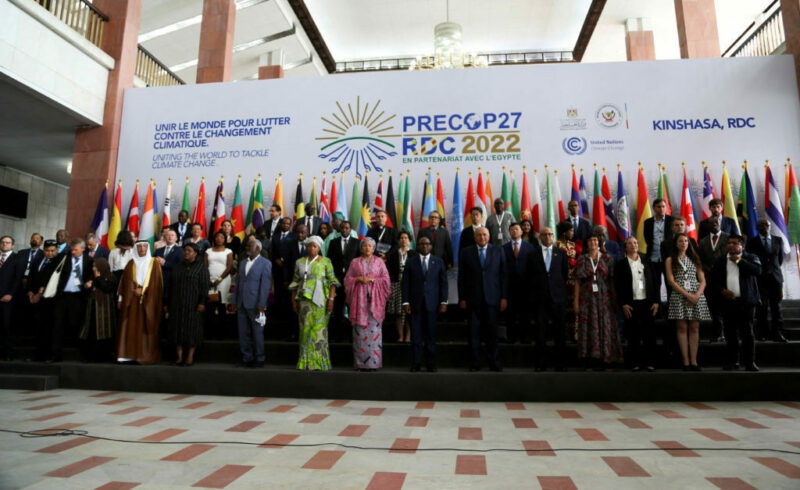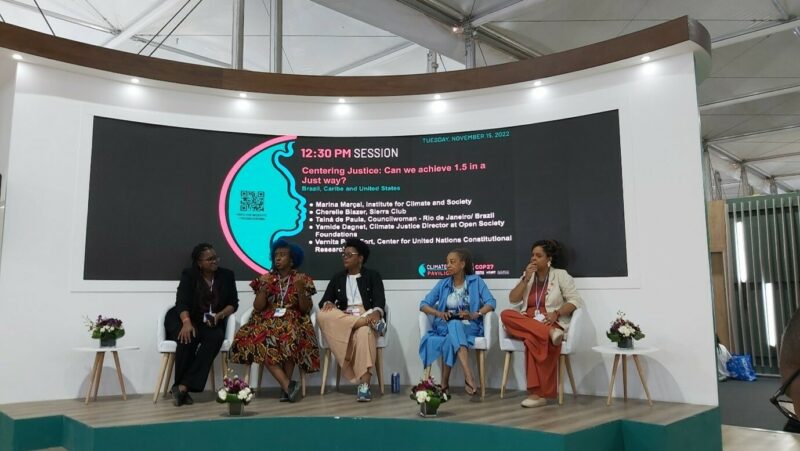Are climate COPs almost out of (fossil) fuel?
Our convenor Oliver Greenfield reflects on his time at the 2022 UN climate negotiations in Sharm el-Sheikh

However you spin it, the final deal struck at COP27 this November is a significant disappointment. Yes, something for loss and damage has been agreed. But with the full $100bn (per year) of climate finance agreed back in 2009 still yet to be honoured, it remains to be seen what ‘new mechanisms’ and ‘finance facilities without finance’ can practically offer. For a successful ‘implementation COP’, we surely need to go beyond this symbolic articulation of the polluter pays principle.
So why was this COP a failure? Two words: fossil fuels. The oil & gas sector were everywhere in Sharm el-Sheikh; some estimates put the figure at 626 different lobbyists in attendance – bigger than any civil society group and delegation, bar next year’s host UAE. The CEO of BP, Bernard Looney, even attended as part of the national delegation of Mauritius.
While negotiators scrabble around for climate finance, in the second quarter of 2022 alone Exxon made US$18 billion, Shell and Chevron close to $12 billion each and BP $8.5 billion. But dwarfing the private fossil majors were the petrostates – with Saudi Aramco in the lead, seeing net income hitting $48.4bn in the second quarter of 2022, up from $25.5bn in 2021.
With savvy blockers at the negotiating table and in the foyers, raising ambition to meet 1.5 degrees while ensuring polluters pay their share looks more and more tenuous. To quote UK COP26 president Alok Sharma, "A clear commitment to phase-out all fossil fuels? Not in this text.” The fingerprints of the oil and gas industry and the petrostates are all over this watered-down deal.
Unpicking the knot
Again and again in the halls of COP I heard a growing clamour from disappointed delegates: “COP is not working. Governments are not doing enough.” With 1.5 degrees now in intensive care and climate multilateralism looking shakier than ever, there is an ever more restless civil society outside at the gates. It is well worth asking whether there are other - or complementary - routes forward; new mechanisms for climate accountability to unpick or cut the knot.
It is worth remembering the UN climate negotiations have faced critical impasses before – the most serious being Copenhagen 2009, when global ambition on decarbonisation lost out to national economic sovereignty. After Copenhagen, the UN and many others concluded that no deal could ever be made while ambitious global climate action was assumed to mean national economic decline.
“ The good news is that a new accountability mechanism is emerging in the fringes: a crosscutting call to renegotiate the social contract.”
The concept of green economy has helped to break this deadlock, and 13 years after the failure of Copenhagen it was everywhere at Sharm el-Sheikh, in the mouths of presidents, ministers and most notably in the COP innovation zone. It still lacks for climate finance and transformative investment – but green economy is there, supplying a credible and ambitious policy vision.
The problem is that economic solutions and supply also need critical mass and demand. Green-curious markets and innovators are just one half of a one-two punch. People and that restless civil society must be let in, even as the fossil lobbyists are chucked out, perhaps via the ‘fossil fuel non-proliferation treaty’ proposed by Tuvalu. The demand for climate ambition and economic reform is there – it just needs to be surfaced with a new mechanism.
A new social contact, a global green deal
The good news is that a new accountability mechanism is emerging in the fringes: a crosscutting call to ‘renegotiate the social contract’. It articulates the bargain between people and their political leaders, “Keep us safe, keep us employed, keep us prosperous, make opportunity for all and we will support transition policies, even changes to taxes and new priorities for public investment.” This call to reform, re-centre nature, and uphold broken social contracts is being championed initially by unions and grassroots activists, but is spreading across social movements, harnessing a wider agenda.

But a social contract for what? This is where green economy fits in – a vision that responds to economic, social and environmental objectives together, but now with mechanisms to embed it in democratic and governmental institutions. Tweaks and adjustments for different places, but a new social bargain and global green deal that can energise multilateral ambition outside of COP negotiating halls.
Bringing coherence
(Green) economic supply and (inclusive) social demand together can bring us closer to the critical mass that might break COP deadlocks. But, with so many political bargains opened up, green deals on the table, and specific mechanisms in play, there is a real risk of incoherence. The GEC is making it our mission to help cut through that confusion. Putting the idea of a social contract for a global green deal at the centre of our adapted strategy, and supporting a learning network with UNRISD to link grassroots social contract reformers around the world. Please join us!
As we bring policy to people, and people to policy, we are fortunate that the European Commission has backed a global green deal and social contract vision; and is investing. We now need to support this in as many countries as possible. Breaking the impasse is not just about A social contract for A global green deal; it is about 195 national deals, and the enthusiasm of millions of people.
With a fair wind and some targeted investment, we think this will be quicker than the 13 years it took the UN, the eco-innovators, (and us) to make green economy a thing. Don’t be patient, but also don’t despair. Back a social contract for a shared green deal. Sign up for the People’s social contract accord.
- Oliver Greenfield, GEC


